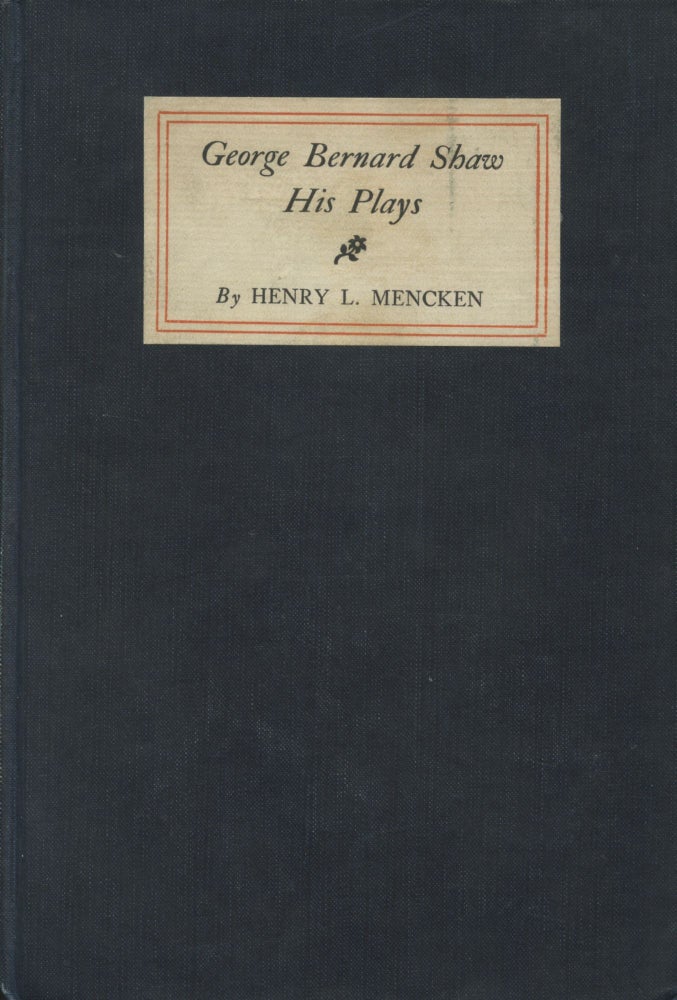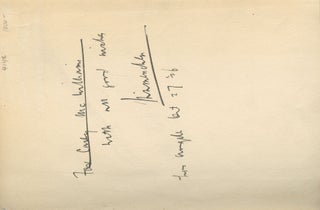George Bernard Shaw: His Plays
Boston: John W. Luce & Co., 1905.
First printing. 107 pp., 5.25 x 7.75 inches. Cloth over boards, with printed cover and spine labels. Light wear to extremities, and scattered faint marks to cloth; light soiling to cover label, otherwise intact and bright; darkening and edge-chipping to spine label, still quite legible. Internally very good, save for a tape repair to one page (see images). Inscribed by the author on the front free endsheet, “For Carey McWilliams, with all good wishes . . . Los Angeles Oct 27 ’26”. Item #4148
Crusading author, journalist, editor, and activist Carey McWilliams (1905-1980), as a teenager read H. L. Mencken and F. Scott Fitzgerald, and organized his life according to the Jazz Age dictates as he understood them:
“I was sixteen when I enrolled at the University of Denver. By that time I was very much interested in books and had scribbled notes for a kind of a novel about that part of the West. Of course I never wrote it. But I was interested in writing and books. And I read Scott Fitzgerald’s This Side of Paradise the year before I enrolled in the University of Denver. It made a great impression on me; I thought this was a wonderful book. And then when I was in the University of Denver, I worked on the paper, the school paper, and so forth. I had discovered Mencken in the meantime, and I bought every copy of the Smart Set as soon as it appeared. I would race down to the newsstand for the latest copy and read all the books Mencken commended.”
A few years later, McWilliams read a Mencken column in The American Mercury that suggested the need for a biography of Ambrose Bierce. Following that lead, McWilliams composed a profile of Bierce for the literary magazine at USC, where he was then a student, and then sent the piece to The Argonaut, the paper once edited by Bierce and still being published in San Francisco. He sent the published piece to his hero, along with a letter. On receipt of Mencken’s response, he wrote in his diary, “Got a short letter from my idol H. L. Mencken yesterday and needless to say I was just too darned tickled to speak — could only yell and shout persistently.” Mencken encouraged McWilliams to pursue his plans to research and write about Bierce’s life; the result was McWilliams’s first book, ultimately published in the fall of 1929 (having been previewed earlier that year with a long profile in The American Mercury).
In October 1926, Mencken had contacted McWilliams to say that he would be in Los Angeles for a few days on his way to see George Sterling in San Francisco (who McWilliams had gotten to know well, at Mencken’s suggestion). Sterling had been Bierce’s protege, and one among the many figures whom McWilliams had interviewed while working on his biography of Bierce. McWilliams went to meet Mencken for the first time, at the Ambassador Hotel, describing it as the “high point of my year” — and quite evidently the occasion for the inscription in this book.
McWilliams went on to write more than a dozen books, including Factories in the Field (about migrant workers, called by some “the nonfiction Grapes of Wrath”) as well as others dealing with the treatment of immigrants and minorities (Brothers Under the Skin, Prejudice, North from Mexico, A Mask for Privilege), and two portraits of the state of California, Southern California Country: An Island on the Land (the inspiration for the screenplay for the film Chinatown) and California: The Great Exception (books that pave the way for the work of writers like Mike Davis). McWilliams worked tirelessly for progressive causes, as an activist, state official, journalist, and as editor of The Nation for twenty years, 1955-1975. Though known to specialists, and acclaimed by peers and followers, his work has yet to reach the wider audience that it deserves.
A marvelous association, and a token of a historic occasion in the life of an undersung hero of American life and letters.
Price: $1,000.00



